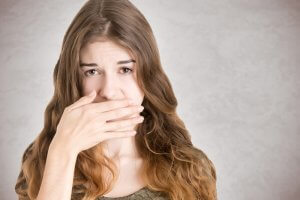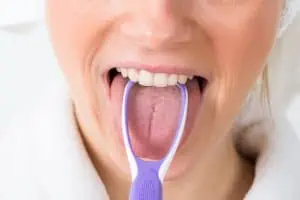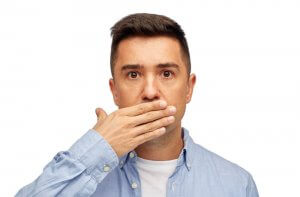Bad breath: nobody wants it, nobody wants the people around them to have it, and yet most of us experience it from time to time. This ailment may be temporary, brought on by something you’ve eaten or a brief lapse in oral hygiene. But if it doesn’t seem to go away, it may be chronic bad breath, known as halitosis.
Either way, you’re probably wondering how to stop bad breath for good and what you can do to get rid of bad breath if you’re struggling with it right now. Or, perhaps you’re concerned about your child or baby’s smelly breath? In this article you can discover:
- Halitosis definition
- Common bad breath symptoms
- Causes of bad breath in children and adults
- Immediate bad breath remedies
- Long-term halitosis cures
- Ways to keep your breath fresh
Our aim is to provide information for how to cure bad breath, and to help you make better choices about your oral health.
What is halitosis?
Sometimes ‘halitosis’ is used as the medical term for bad breath, which 16% of Americans report having. But some organizations, including the American Dental Association, make a distinction between smelly breath and halitosis. These organizations define halitosis as chronic bad breath, meaning it is a recurring condition rather than a temporary problem. A lot of people throw around the term ‘chronic halitosis’ which is actually quite redundant. The term ‘oral malodor’ might also be used to talk about the wider problem of smelly breath.


In any case, the important thing is to understand the causes of halitosis and know what to do about it.
More often than not, smelly breath is caused by bacteria in the mouth and throat. In fact, it’s estimated that around 90% of cases have their origin in the oral cavity. There are numerous factors that can contribute to smelly breath, and we’ll cover those in more detail below.
In the remaining 10% of cases, bad breath can come from the stomach or other parts of the body because of underlying medical conditions. Certain medications can also cause breath to smell bad.
Only about 25% of people actually have bad breath that becomes chronic or lingers. This type of bad breath is clinically termed “halitosis” and is generally the result of poor oral hygiene. Bad breath starts in the mouth, and for people who have this as a chronic problem, it is a sign that something is wrong. There are many causes of bad breath. Seek the help of a medical or dental professional to determine the exact cause if you have bad breath that’s not caused by food or oral hygiene problems. Major causes of lingering bad breath are tooth decay and gum disease. Consistent oral hygiene habits can help you avoid these symptoms.
Dr. Kevin Varley, Stonebrook Family Dental
How to tell if you have it
So how do you tell if you have bad breath? It can be hard to know if you have it, since there are no visible halitosis symptoms.
One way to check your breath yourself is to lick your wrist, wait for it to dry, and give it a sniff. If it smells bad where you licked it, chances are your breath smells the same. This test isn’t foolproof, but it should give you a good indication of what others can smell.


You might notice people turning away when you talk to them, but it’s best not to over-analyze such behavior. While some people can be completely oblivious to the odors they’re projecting towards others, some people believe they have constant bad breath when in fact their breath is normal. This is known as ‘halitophobia’, fear of smelly breath. People with halitophobia can become obsessed with their oral hygiene in an effort to improve their breath, and this may result in damage to teeth and gums through over-brushing.
If you want to know if your breath smells bad, it’s best to ask a close friend or family member who you trust to give you an honest answer. Alternatively, mention your concerns to your dentist or hygienist at your next visit. They won’t be embarrassed to tell you the truth, and can offer advice if it turns out you do have it.
What causes bad breath?
So what causes halitosis? Let’s take a look at some of the most common causes of bad breath, and the people who might be most susceptible.
Poor oral hygiene
One of the most common reasons for smelly breath is a buildup of food particles and plaque in the mouth. Food not removed by brushing and flossing will start to rot, emitting the same kinds of smells you’d expect from a kitchen bin or compost heap.
Meanwhile, a sticky film, dental plaque, is constantly building up on your teeth. The bacteria in plaque feed on carbohydrates left behind from your food and drink, producing acids in the process. As you can imagine, plaque doesn’t make your mouth smell great.
If you have crooked teeth or wear fixed braces, there are more places for food to become trapped and for bacteria to build up. Removable braces and dentures can also become smelly if they aren’t cleaned properly.
Saliva goes some way towards neutralizing plaque acids and washing away bad smells, but regular brushing and flossing is the only way to combat this problem properly.
Dental problems
Infections and halitosis
Plaque (and the acid it produces) is responsible for tooth decay, cavities and gum disease. If one of your teeth is rotting, it stands to reason that it will produce a bad smell. Any other kind of infection in the mouth, for example from an impacted tooth, abscess or ulcer, might also lead to halitosis.
Tooth extraction
If you notice bad breath after a tooth extraction, including bad breath after wisdom teeth removal, it could be a sign of infection or dry socket. Contact your dentist straight away, especially if you are experiencing pain.
Food, drink and smoking
The things you consume affect how your breath smells. The following may all cause bad breath:


- Tobacco: Smoking causes smelly breath because the chemicals in tobacco leave a bad odor in the mouth and throat. Tobacco products can also contribute to gum disease and dry out the mouth, making your symptoms worse.
- Sugary and acidic foods: Although these foods that cause bad breath aren’t particularly smelly themselves, they contribute to faster plaque buildup.
- Strong-smelling foods: The foods that cause bad breath are pretty obvious; garlic, onion, spicy foods, and fish can all leave behind a smell that’s hard to disguise.
- Alcohol: Not only does alcohol dry the mouth out; many types of alcohol also contain sugars. The perfect recipe for bad morning breath, especially if you forget to brush your teeth after consuming it.
- Coffee: The acidity and strong aroma of coffee lead to its distinctive smell.
- Keto bad breath: “Keto” diets which involve high fat and protein intake result in the production of smelly chemicals called ketones. This is one of the most easily identifiable types of bad breath smells, also called keto breath, something like a fruity nail polish remover. Ketones are also produced when a person with diabetes is low on insulin.
Dry mouth


Another of the causes of bad breath is a condition called xerostomia, more commonly known as ‘dry mouth’. This occurs when the salivary glands aren’t producing enough saliva to keep the mouth moist.
Without enough saliva in the mouth, food isn’t washed away as effectively and bacteria build up more quickly, causing breath to stink. Factors that contribute to this condition include alcohol, tobacco, caffeine, certain medications, and some medical conditions.
Nose and throat infections
A sinus infection or sore throat and smelly breath often go hand-in-hand. Excess mucus produced by your body to fight these infections causes post-nasal drip, and oral malodor arises from bacteria feeding on that mucus in your throat. If you have post-nasal drip bad breath, symptoms are likely to go away once your sinus infection is gone.
Bad breath from stomach causes
Although the causes of bad breath are usually in the mouth, it’s possible to get bad breath from the stomach as a result of other health conditions, including:
- Acid reflux
- Diabetes
- Liver or kidney disease
- Other digestive/metabolic problems
- Stomach cancer
In the short video clip below, it is explained exactly how acid reflux can cause halitosis. Your GP can advise you if you’re concerned about this or any of the other problems mentioned above.
How to cure bad breath from the stomach
If you’re wondering how to cure bad breath coming from the stomach, the most important thing you can do is visit your doctor; you can work together to come up with a plan for how to treat bad breath.
Stinky breath in the morning
If your breath smells bad in the morning, it could be a sign you didn’t do a good enough job of removing plaque from your teeth the night before. The fact that your mouth naturally dries out overnight doesn’t help.
Using an antibacterial mouthwash right before bedtime can help keep bacteria at bay until the morning and alleviate bad morning breath. Just don’t use mouthwash immediately after brushing, as it washes off the beneficial ingredients in your toothpaste.
If you have constant bad breath in the morning, consider using a plaque disclosing tablet after brushing in the evening. This will show you exactly how much plaque is left on your teeth after you think they are clean. Also, take note of what you eat in the evening, and avoid foods and drinks that make your morning breath worse.
Bad breath in children
Bad breath can occur in kids and toddlers, just like with adults if they don’t keep their teeth clean. To prevent your kid or toddler from having smelly breath, take them for regular dental visits to check for cavities. You’ll also want to make sure to prevent symptoms in children by establishing a good oral hygiene routine early on. Additionally, bad breath in children, especially younger children and toddlers, might also be caused by something they’ve stuck up their nose.
Smelly breath in babies
If your baby has symptoms while teething, it’s possible that some food has got stuck under one of the small flaps of gum. For baby bad breath, use a baby toothbrush for prevention, but speak to a dentist if you notice inflammation that’s worsening.
Bad breath during pregnancy
It’s quite common for women to experience bad breath in pregnancy, especially if they are vomiting due to morning sickness, which is one of the bad breath causes during pregnancy. As well as this, bad breath during pregnancy may be caused by a calcium deficiency. Another reason for bad breath during pregnancy are hormonal changes in the mouth that contribute to dehydration and halitosis.
Even if you don’t experience increased bad breath in pregnancy, you might notice other people’s halitosis way more, due to increased sense of smell!
How to get rid of bad breath fast
So you’ve got a job interview or a first date coming up and you realize your breath isn’t as fresh as you’d like, and you need a fast halitosis cure; what do you do? Here are some ways to fix bad breath quickly—ranging from store-bought solutions to halitosis home remedies—but keep in mind that these are only good for getting rid of bad breath temporarily.
Best products for bad breath
Since halitosis is such a common thing that we deal with, you can choose from tons of bad breath products online, at the supermarket, at the pharmacy and even at the gas station. Have a look at the following bad breath products to see if any are appealing to you.
The best mouthwash for bad breath
A quick swish with bad breath mouthwash helps stop bad breath in a couple of ways. Firstly, it can dislodge food particles and bacteria that would otherwise be making your mouth smell. Secondly, it freshens breath, usually with mint or other herbs.
There are normal mouthwashes, and then there are specifically bad breath mouthwashes. TheraBreath mouthwash is a great option for those who prefer a mild mint flavor and are looking for a product made in the US. What’s more, this mouthwash for halitosis is vegan, kosher and free from artificial colors and flavors. Although it’s not as cheap as other brands, users say it’s worth paying the extra for a product that really does work.
“This mouthwash isn’t cheap but it works for me so I think it’s worth it.” says one reviewer.
Not to mention, this quick bad breath cure has received the ADA Seal of Acceptance. We’ve got more product recommendations in our best mouthwash guide, and a separate guide to natural mouthwash if you’re interested to know about some other options.
Best toothpaste for bad breath
A natural herbal toothpaste might also be effective at stopping bad breath; our guide to natural and homemade toothpaste has some recommendations and recipes. Ultimately, the best toothpaste for your bad breath may come down to personal preference as much as the toothpaste itself.
If you want to read about different toothpastes for special considerations like bad breath, check out our guide for the best toothpaste.
Chewing gum/mints
Wondering how to get rid of smelly breath on the go? If you’re out and about, although not a bad breath cure, the most convenient way to get rid of bad breath is usually with chewing gum or mints. They’re widely available, you don’t have to find a bathroom, and within a couple of minutes your mouth should be much fresher.
Choose a brand and flavor according to your own preference, but make sure it’s sugar-free. Otherwise, the fresh minty taste will soon give way to even more fuzzy plaque on your teeth. Chewing gum containing xylitol can also help fight decay.
Oral probiotics
Oral probiotics are beneficial bacteria that can help control the bacteria that cause bad breath. They have other benefits too when added to your oral hygiene routine. They fight the bacteria that causes decay and cavities.
If you’re worried about your child’s breath, you can find out more in our article about oral probiotics for kids.
Home remedies for bad breath
Want to know how to fix bad breath at home? You don’t even have to go to the store to find effective treatments. Staying hydrated with water is arguably one of the best things you can do, but there are other bad breath remedies that you can try at home that are worth noting. Try one of these natural remedies for bad breath at home and see if it makes a difference:
Apple cider vinegar
If you’re wondering how to prevent bad breath naturally, look no further than your pantry. Apple cider vinegar features many bacteria-fighting properties, even some that can kill the strep virus. Well, these antibacterial properties also kill off the bacteria that can cause breath to smell bad. To use apple cider vinegar for bad breath, simply mix it with a bit of warm water and use it as a daily mouthwash for halitosis.
Tea tree oil
Tea tree oil has long been used to cure many ailments, and now you can use tea tree oil for bad breath too! This can be an effective cure for halitosis because it helps fight against odor-causing bacteria and microbes. This halitosis home remedy can be easily added to your oral hygiene routine by mixing a few drops of tea tree oil to your toothpaste, or brushing with tea tree oil alone.
Cinnamon is another essential oil for bad breath that you may want to try.
Vitamins and supplements for bad breath
Vitamins for bad breath may be a solution for you as well. Sometimes smelly breath is caused by a deficiency in vitamins. Ask your doctor about your problem—they may run a test to see if you are deficient for any vitamins, most commonly A, B, C and E as deficiencies in these vitamans can cause bad breath.
Have a look at the following table for a look at some of the other common natural remedies for bad breath.
Home remedy | How it works |
Parsley | Chew on it after eating to release chlorophyll which neutralizes odors. |
Green tea and mint tea | Temporarily disinfects the mouth and freshens breath. |
Fennel | Antibacterial and increases saliva production. Chew it or make a tea. |
Priobiotic yogurt | Fights bacteria in the mouth. Eat around 7 oz a day for best effects. |
Baking soda mouthwash | Antibacterial. Dissolve 2 teaspoons of baking soda in a glass of warm water, swish around for 30 seconds, and spit. |
How to cure bad breath permanently
If you’re wondering how to get rid of bad breath permanently, sometimes, all it takes to stop bad breath is a few lifestyle changes.


An improved oral hygiene routine might be enough to cure halitosis. This is maybe one of the simplest bad breath remedies, and means brushing twice daily (one of those times being before bed) and flossing once a day. A tongue scraper can help keep the tongue free from excess bacteria, too, one of the most common halitosis causes. Read more about the correct routine and technique in our how to brush your teeth.
Be sure to visit your dentist for regular checkups as well. They may recommend a scale and polish to remove plaque and tartar, leaving teeth completely clean and serving as a halitosis cure.
You can also avoid the foods and drinks mentioned above which are common causes of bad breath and may be a good halitosis cure.
If you know that you suffer from dry mouth, make an effort to stay hydrated during the day. You can also take an over-the-counter moisturizing product to stop your mouth from getting too dry. If your bad breath is caused by sleeping with your mouth open at night, you can also see if mouth tape helps.
Finally, if you smoke, the best thing is to quit. Even if you use e-cigarettes that don’t have a bad smell, the nicotine in them inhibits saliva production, thereby contributing indirectly to halitosis. So quitting smoking may be one of the most obvious bad breath remedies for you.
Treatment for chronic symptoms
Trouble finding a halitosis cure? If you have tried all of the above bad breath cures and don’t notice a difference, you may need to seek medical treatment for chronic bad breath.
The first stop on the path to figuring out how to treat halitosis, or chronic bad breath, should be your dentist. Fixing any underlying oral health problems like gum disease, cavities, and ill-fitting dentures might just be a halitosis cure. Bad breath treatment may include teeth cleaning, fillings, extractions and new dentures, much of which should be partially covered by dental insurance.
It’s possible for oral malodor to be caused by an overgrowth of healthy bacteria, as this dentist discusses.
If your dentist can’t identify any causes in your mouth, he might refer you to a GP for further medical checks. Then, the matter of how to treat your chronic bad breath will depend on the cause that is ultimately identified.
Conclusion
Whether you’re wondering how to cure bad breath quickly. or looking for a longer-term treatment for halitosis, the answer more than likely lies in your oral hygiene. While there are various quick fixes like mouthwash and breath spray that will get rid of your symptoms temporarily, better dental health is the best way to stop it for good.
You might also need a dental checkup to treat triggers like tartar buildup, tooth decay and gum disease. In rarer cases, the cure for bad breath might involve treating another health problem like diabetes or acid reflux.
FAQs


Why do I have bad breath?
It might be because of something you ate, because you’re not brushing your teeth well enough, or because of some underlying cause that requires further treatment. If this is the case, your best bet for a bad breath cure maybe be better oral hygiene, or you may need to consult a dentist.
What causes bad breath even after brushing?
If you’re flossing and brushing daily, there could be another problem or medical condition that’s causing your breath to smell bad such as cavities and gum disease. Diabetes and various digestive problems can cause bad breath from the stomach.
If you follow good hygiene protocol, and still suffer from this problem, you should consult with your physician to find the source of the odor. It’s important to see your doctor, as persistent symptoms can be a sign of the conditions mentioned above, as well as acid reflux, sinus inflammation, chronic dry mouth, and more serious diseases; in fact bad breath and cancer are related on occasion.
Can wisdom teeth cause bad breath?
Decaying and infected wisdom teeth can be causes. Additionally, crooked wisdom teeth are more likely to trap food, which will start to smell if not cleaned right away.
Is a white tongue linked to halitosis symptoms?
Bacteria can build up on the tongue and cause the papillae on the tongue’s surface to swell. The result is a white tongue, often accompanied by an unpleasant odor. Causes of white tongue include dry mouth, dehydration, smoking, alcohol, mouth breathing and poor oral hygiene—very similar to the causes of halitosis.
Why does my baby have bad breath?
It’s not always a sweet newborn smell. Babies and bad breath can go hand in hand. That’s because babies, can suffer from sinus infections and colds, which create bad breath-causing bacteria. Additionally, poor oral hygiene can also lead to your baby struggling with this issue.
Do cavities cause bad breath?
Cavities can indeed cause symptoms, as they give bacteria hard-to-clean hiding places in your mouth. The same goes for deep pockets from gum disease.
What are some natural remedies for bad breath?
Many people want to know how to cure halitosis naturally. Some of the most common natural remedies for bad breath include chewing parsley, drinking green tea, or using a baking soda mouthwash. Check out the table above for more information.


Why do I have bad breath after wisdom teeth removal?
If you’re experiencing bad breath after wisdom teeth extraction, accompanied by worsening pain and swelling four to six days after surgery, it could be the sign of an infection. It’s important to contact your dentist ASAP so the infection doesn’t get worse.
Wisdom teeth removal may cause bad breath if you have dry socket as well. Dry socket is relatively common following extraction. After wisdom teeth removal you may experience smelly breath, increasing pain and a foul taste. You must contact your dentist if you experience these symptoms.
What causes bad breath from the stomach?
Bad breath from the stomach can be caused by a number of factors including reflux, kidney disease and ulcers. You should make sure to see your doctor if you have chronic halitosis from the stomach.
American Dental Association: Halitosis. Consulted 18th October 2024.
NCBI: Halitosis: From diagnosis to management. Consulted 18th October 2024.
Mayo Clinic: White tongue. Consulted 18th October 2024.
JOCPD: Effect of Probiotic Yogurt and Xylitol-Containing Chewing Gums on Salivary S Mutans Count. Consulted 18th October 2024.
MouthHealthy: TheraBreath Fresh Breath Oral Rinse. Consulted 12th March 2024.
NCBI: Pregnancy and olfaction: a review. Consulted 18th October 2024.
NCBI: Antimicrobial activity of apple cider vinegar against Escherichia coli, Staphylococcus aureus and Candida albicans; downregulating cytokine and microbial protein expression. Consulted 18th October 2024.
Sunstar: Global Healthy Thinking Report. Consulted 11th September 2024.
Mayo Clinic: Bad breath. Consulted 18th October 2024.
Smithsonianmag.com: Your Breath Does More Than Repulse—It Can Also Tell Doctors Whether You Have Cancer. Consulted 18th October 2024.




